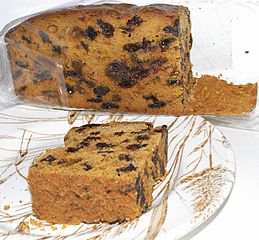Genoa cake facts for kids

Genoa cake (supermarket own-brand with few cherries)
|
|||||||
| Type | Fruit cake | ||||||
|---|---|---|---|---|---|---|---|
| Place of origin | Italy | ||||||
| Region or state | Genoa | ||||||
| Main ingredients | Sultanas/raisins or currants, glacé cherries, flour, eggs, butter, sugar | ||||||
| 340 kcal (1424 kJ) | |||||||
|
|||||||
Genoa cake is a delicious fruit cake. It's full of tasty ingredients like sultanas (which are golden raisins), currants, and sweet glacé cherries. You might also find almonds and candied orange peel inside. All these yummy bits are baked in a batter made from flour, eggs, butter, and sugar.
Contents
Where Does Genoa Cake Come From?
The name Genoa cake is mostly used in the UK. People there have been baking it since the 1800s. But this cake actually comes from Genoa, a city in Italy.
The Original Pandolce
In Italy, the original cake is called pandolce. This means "sweet bread" in Italian. It started in Genoa way back in the 1500s. It was first made as a special Christmas cake.
The traditional pandolce is a bit different from the Genoa cake you might know. It uses pine nuts, and it's made with yeast. Yeast makes the dough rise slowly, just like bread. This original, taller version is called pandolce alto.
Modern Pandolce
There's also a simpler, flatter version of pandolce. It's called pandolce basso. This one uses baking powder to make it rise quickly. It's very similar to the Genoa cake sold in the UK. It has a soft but slightly crumbly texture.
Other Genoa Cakes
Sometimes, the name Genoa cake can be confusing. That's because there are two other cakes also linked to Genoa, but they are not fruit cakes:
- Génoise cake is a very light and airy sponge cake.
- Pain de Gênes (which means 'Genoa bread') is a rich, dense cake made mostly with almonds.
See also
 In Spanish: Pandolce para niños
In Spanish: Pandolce para niños
 | Toni Morrison |
 | Barack Obama |
 | Martin Luther King Jr. |
 | Ralph Bunche |

